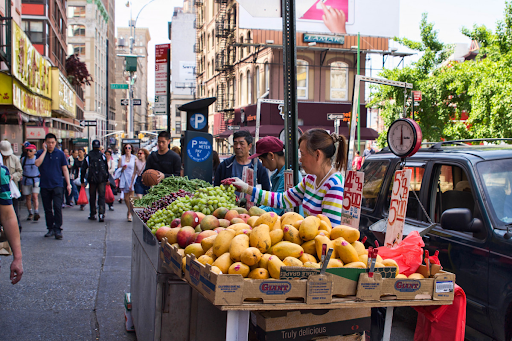On November 4th, 2024, by a margin of 140,000 votes, New Yorkers approved one ballot measure that would prompt crackdowns on street vendors who offer a variety of products including general goods, fresh produce and prepared foods. Known as Proposition Two, the referendum allows the New York City Department of Sanitation to clean city property and enforce street vendor regulations.
Street vendors in Corona Plaza, Queens, were turned upside down this summer and in April there was a surge of street vendor fines across Brooklyn. Across the city, illegal street vendors are a controversial issue. While open-air retail and food services offer opportunities to those with less capital on hand, it is extremely difficult to obtain a proper permit. Raising the cap on the number of permits issued could allow for a vibrant and sanitary street vending industry.
The crackdown in Corona Plaza consisted of arrests and confiscation of property. In the first three quarters of 2024, New York City’s Police and Sanitation Departments issued 9,000 tickets to vendors, doubling the number of tickets given since 2023. “It’s definitely going to have a disproportionate impact on the working class, especially on immigrants,” noted Social Science Research major Reuben Sparrow-Blustain (‘26). Some view street vending as a sanitary concern, while others see it as an economic opportunity.
“It’s an important element of the economy,” said Economics teacher Mr. Steve Apollon, who explained that for some people street vending is a gateway to more profitable employment or even small business ownership.
Currently, the majority of mobile food vendors surveyed by the Immigrant Research Initiative operate without a license, meaning they do not pay taxes and are subject to legal prosecution. Both food vending and general vending permits have waiting lists of around 10,000 people. Regardless of a vendor’s respect for regulations, permits are simply inaccessible.
Eliminating the cap on the number of street vendor permits would generate up to $17 million in tax revenue. One bill, primarily sponsored by Councilperson Pierina Ana Sanchez in December, would increase the cap over five years, followed by lifting the cap entirely in 2029. This bill is still being processed in the City Council.
“Probably a little bit more street vendors wouldn’t be that much of a big deal,” reasoned Economics teacher Mr. Francis Mayle, further noting that “You don’t want to walk down every sidewalk and have it just be covered by street vendors.”
Despite legitimate concerns about sanitation and the use of public space, a permit cap is not the answer. Adding permits would not remove the regulations on mobile food vendors and general vendors, which restrict vendors to certain areas of the city and set strict standards for sanitation. Sparrow-Blustain noted that when permits are restricted, street vendors may be “forced to not comply with any of the regulations, including the health ones,” but suggested “You could just do a sanitation check.”
Other students feel the city has overreached in its recent enforcement campaign. “I believe in regulation, but I don’t believe in this crackdown,” said Chemical Engineering major Jeremy Oppenzato (‘26). Street vending is an opportunity for immigrants and people with less capital to enter the economy and prosper. “This gives them an opportunity…and allows them to do something they’re familiar with,” Apollon emphasized.
A report from the Immigrant Research Initiative found that 96% of street vendors in New York are immigrants, and for 96% of them street vending is their primary source of income. Having a permit greatly increases the profitability of street vending, allowing these new arrivals to invest in themselves and thrive, but only if they have the means to start up a stall. “The government can encourage private industry to find new ways of providing access to capital for people who start a business,” Apollon remarked.
Street vendors are a vital representation of the diversity New York City is known for. Immigrants hailing from countries from Egypt to Mexico share elements of their culture and build communities for other immigrants. “They provide an ambience and flavor to the city,” said Apollon.
When allowed to flourish, street vending brings jobs, opportunities, and healthy and affordable food to New York City.








































